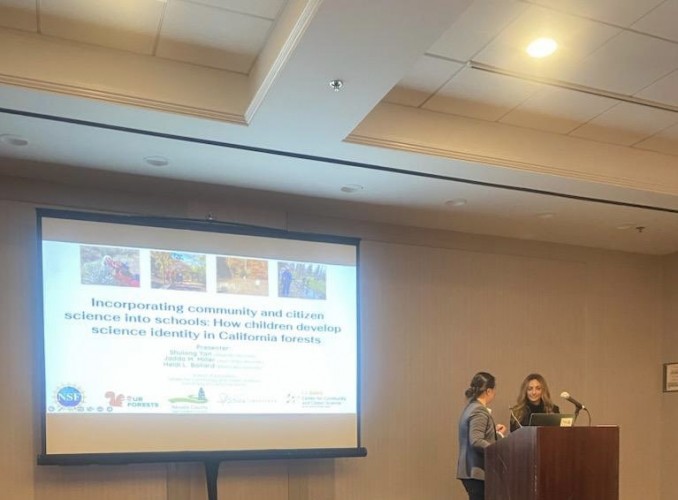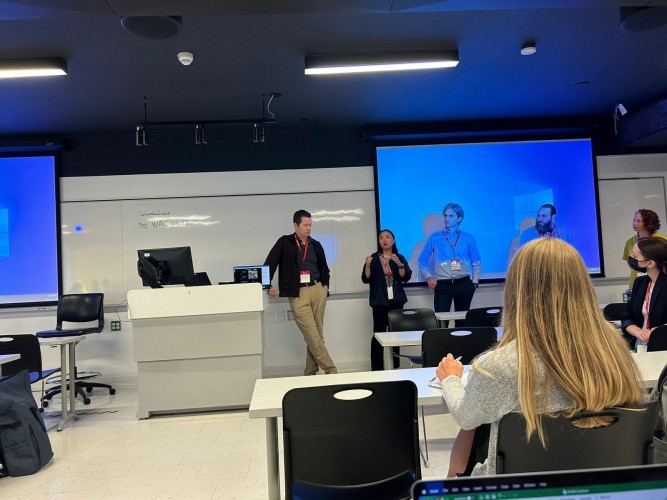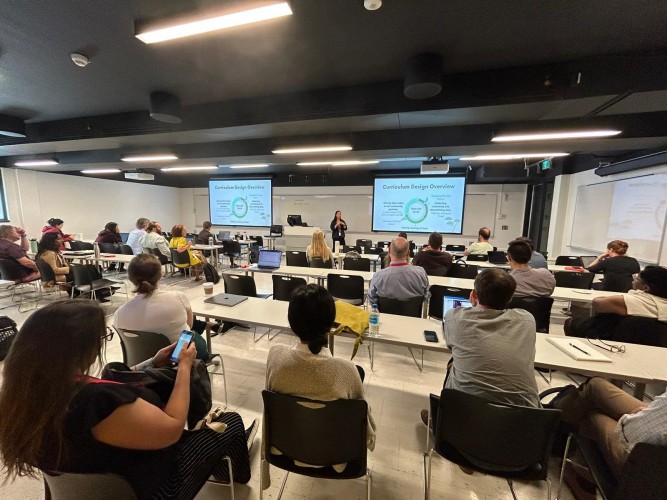Find us virtually and abroad presenting our work!
Upcoming NAAEE conference and past conferences offer opportunities to share the Center's research and projects
Sharing findings with outside audiences is one of our youth-centered community and citizen science practices effective in promoting learning and environmental science agency. Turns out, it’s also really great for us working here at the Center too! We’ve been busy this year, in addition to the Citizen Science Association C*Sci 2023 Conference, traveling to present research findings from our projects. This fall you can find us on your screen as we present at the virtual North American Association of Environmental Education conference.
Upcoming conferences
This October 17-20, 2023, find three poster presentations from the Center at NAAEE:
Increasing Capacity for Environmental Education and
Community Science in Clear Lake
Presented by Sarah Angulo
Find more information on the project
page.
This poster describes a project underway in the Clear Lake region
of California. The UC Davis Center for Regional Change and UC
Davis Center for Community and Citizen Science is gathering,
developing, and disseminating EE materials to support youth and
others in their own withstanding work to take good care of Clear
Lake and its watersheds. This project seeks to further ongoing
lake-oriented science learning and advocacy opportunities offered
to youth in order to strengthen the work of local organizations
delivering and coordinating EE. The materials gathered and
developed aim to be inclusive of the whole watershed, accessible
to educators lake-wide, and housed within the community long
term.
We started by gathering existing environmental education programs
and resources shared by community-based partners as well as local
offices of education. Feedback from local leaders representing
Tribes, county and state agencies, nonprofits, and community
groups is guiding the contents and focus of the youth community
science (YCS) materials.
This project is developing YCS materials focused on community
science projects already in place throughout the region, to tie
together the existing environmental education programs and
resources in Clear Lake. With YCS, youth contribute to authentic
science. We know from research that YCS projects can promote
stewardship, student learning, engagement in advocacy, and youth
agency, among many other benefits. The development process
includes recruiting local partners to train and pilot EE and YCS
materials.
Through this poster, we offer insights about the various
co-benefits – and challenges – of regionally focused EE and YCS
development. We share our considerations given regional history,
interrelationships between groups, and community needs that can
be utilized by colleagues. As we are currently developing
materials, a poster presentation also allows the opportunity to
invite feedback on our process and ideas for future phases of the
project.
Developing Interdisciplinary Participatory Science for
Under-resourced Youth Alongside Watershed
Researchers,
Presented by Peggy Harte
Find more information on the project page.
Thiamine Deficiency Complex (TDC), a compound critical for essential metabolic processes, was first documented in California’s salmon in 2020. Symptoms of TDC in juveniles manifest as spinning, lethargy and eventual death. As scientists investigated the cause, the team at the Center for Community and Citizen Science, in collaboration with researchers at the Center for Watershed Sciences, NOAA Fisheries and the California Department of Fish and Wildlife, developed an innovative observation protocol and lesson sequence as part of the Classroom Aquariums Education Program. The scientists measure the thiamine concentrations in the eggs and students measure the survival and TDC symptoms of the progeny. Student data submitted is being used to quantify the relationship between egg thiamine and juvenile survival, a missing piece of information needed by the broad coalition of scientists working on solving the TDC puzzle. With a focus on equity and access to under-resourced communities, year two of this project expanded with a concentration on collaboration with high school students attending continuation schools and others enrolled in college opportunity programs. During the poster session, we will share lessons developed around a research based framework for youth engagement in participatory science that take an interdisciplinary approach, connecting students with researchers and content directly through a variety of ways. These lessons build student skill, as well as highlighting college, career technical education pathways, science and math, in addition to supporting students’ abilities to answer student generated questions. We will also be sharing results from year two of this program as it has expanded into 5 counties in California. In addition, we will share an outline of program development and highlight lessons learned from the second year, focusing on developing the researcher/classroom/teacher/student collaboration process. Attendees will also learn more about effective practices for connecting underserved youth directly with scientific researchers in a collaborative and iterative way.
Our Forests
Presented by Jadda Miller
Find more information on the project
page.
Our Forests is an NSF-funded collaborative research-practice partnership with the Center for Community and Citizen Science at U.C. Davis, Sierra Streams Institute watershed organization, and the Nevada County Superintendent of Schools in Northern California. Our Forests is geared towards students in grades 3-5 and takes place over the course of a year. It utilizes a place-based approach to encourage community engagement and citizen science. The program’s primary goal is to monitor forest health and prevent large-scale wildfires across the county.
As part of a larger study, we are examining how participation in the Our Forests program may have impacted students’ sense of place, which includes the meanings of and attachment to a particular place held by an individual or a community. We ask the question: Can participating in a place-based CCS program focused on a locally-urgent environmental issue, influence elementary students’ sense of place?
In 2021-22, students participated in 5 full-day Forest Investigations in which they learned to make observations, use a variety of forest monitoring tools to collect data following a forest monitoring protocol and analyze the data to share the results with land managers. We conducted semi-structured interviews with 45 focal youth (FY) after the year-long program. We present a thematic analysis of 15 FY (4th grade) to identify patterns in their experiences with different aspects of sense of place. We examined aspects of students’ participation in data collection, including observations, using scientific tools, and collaboration on ensuring data accuracy, and compared these experiences with learning outcomes including forest content knowledge gains, science reasoning practices, and sense of place aspects described above.
Our preliminary results highlight a strong reciprocal relationship between students’ increased scientific knowledge and reasoning practices and their sense of place, particularly related to studying the same site over time. This finding suggests that participating in CCS programs in local ecosystems can contribute not only to place-specific knowledge gains but a sense of commitment to a place where young people believe in their ability to protect and care for their home, neighborhood, community, and planet.
Past conferences
In March, Heidi Ballard served on two different international Advisory Boards for youth CCS projects – one included giving invited talks in Spain.
In April, Shulong Yan, Jadda Miller, and Todd
Harwell each presented  three different research projects at the National
Associate for Research in Science Teaching conference in Chicago.
three different research projects at the National
Associate for Research in Science Teaching conference in Chicago.
In June, Shulong Yan presented on the Our Forests project at the International Society for the Learning Sciences meeting in Montreal.










